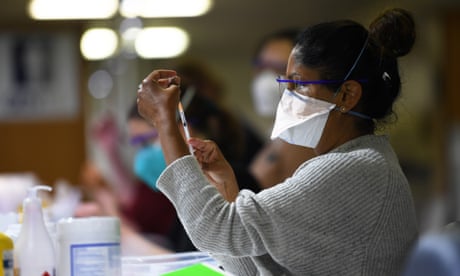- by foxnews
- 23 May 2025
With Covid cases surging across Australia, will a fourth vaccine dose be required?
With Covid cases surging across Australia, will a fourth vaccine dose be required?
- by theguardian
- 22 Mar 2022
- in news

Health experts are weighing up whether a second booster rollout will soon be needed as Covid-19 cases again surge across Australia and winter approaches. A number of nations, including the UK, are rapidly expanding eligibility for a fourth dose, but some experts have questioned its effectiveness.
The government has yet to commit to a second booster rollout. However, it is expected older Australians will be the first to be eligible when it does begin.
Hunt said it was more likely than not a fourth dose would be needed for some groups of the population ahead of winter, when a spike in both Covid and flu infections is forecast.
A limited number of people are eligible already. A fourth vaccination dose is recommended for severely immunocompromised people aged over 16, who produce a lower immune response than the equivalent number of doses in healthy people.
Earlier this year, adults with weakened immune systems, including cancer patients, became eligible to receive a fourth vaccination after Atagi guidelines changed due to the Omicron outbreak.
Last month, the booster program was further expanded to severely immunocompromised adolescents aged 16 and 17.
Cancer Australia CEO, professor Dorothy Keefe, said immunocompromised people could have a prolonged Covid infection which increased the risk of viral variants developing.
Until recently, a number of countries including the US, Chile, Denmark, Germany, Sweden and the UK were similarly limiting second boosters to the immunocompromised.
But this week, England expands its eligibility to about five million people including care home residents, people over 75 and immunocompromised people aged over 12. It follows a resurgence of Covid cases across the UK, with infections in the over-70s at a record high.
Similarly in Asia, South Korea is recommending a fourth dose for nursing home and care residents and workers as well as the immunocompromised in light of rising infections among elderly people.
Israel was the first country to administer a fourth dose more widely. It began to roll out third doses in July, and since January, anyone who is a health worker, immunocompromised, or over 60 has been eligible for a fourth vaccine. Israeli health experts have since suggested a fourth dose for all adults.
Last week, Pfizer and BioNTech requested emergency authorisation from the US Food and Drug Administration for a fourth dose among the over 65s, citing Israeli datasets which showed an additional mRNA booster lowered infections and severe illness.
Deakin University chair of epidemiology, Prof Catherine Bennett, said it was still too early to tell what cover the third dose provided and whether vaccinating with a fourth dose would change health outcomes.
But she said Australia had the benefit of being one season behind and being able to monitor what was occurring in the rest of the world.
The Omicron sub-variant BA.2 is on the rise in Australia, and is expected to become the dominant strain of Covid-19 in the coming months. It is highly likely BA.2, which shares similar mutations to Omicron, will be similarly resistant to a third dose.
An Israeli trial released in February suggested receiving a fourth vaccine raised antibody levels, but provided little extra protection against Covid-19 in addition to a third dose.
As of 13 March, only 65.6% of eligible people had received a third vaccine dose, while in Aboriginal and Torres Strait Islander communities, just 49.4% had the jab.
The seasonal flu all but disappeared in 2020 and 2021 due to public health measures, however Atagi expects a resurgence of the virus outside the usual influenza season as international borders reopen and with Covid restrictions eased.
- by foxnews
- descember 09, 2016
United Airlines flight returns to Hawaii after concerning message found on bathroom mirror; FBI investigating
United Airlines Flight 1169 to Los Angeles returned to Hawaii after a "potential security concern" aboard the plane. The FBI and police are investigating.
read more


